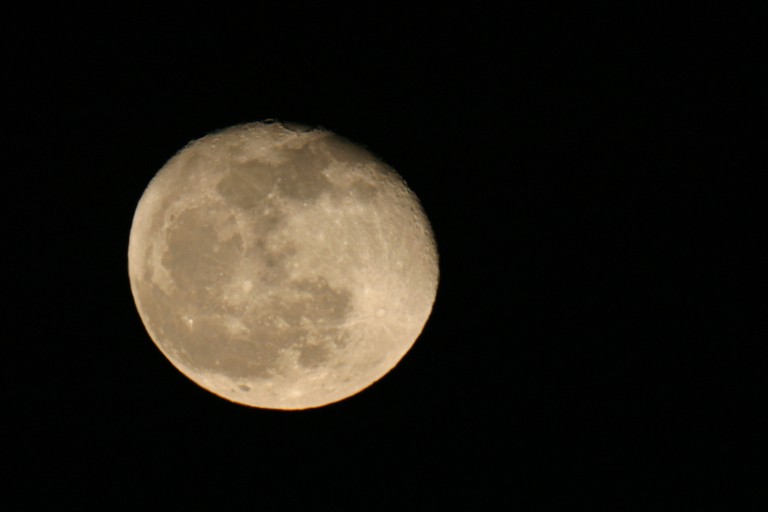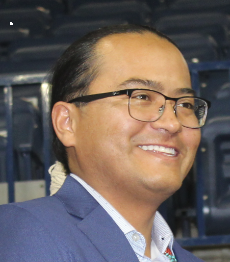
- Details
- By Levi Rickert
The moon has long been revered by many Native American tribes. So, when Navajo Nation President Buu Nygren recently discovered that NASA is planning to launch a rocket headed to the moon in early January with cremated human remains to be placed there, he sent a letter to NASA and the U.S. Department of Transportation asking to delay the launch.
“It is crucial to emphasize that the moon holds a sacred position in many Indigenous cultures, including ours,” President Nygren wrote. “We view it as a part of our spiritual heritage, an object of reverence and respect. The act of depositing human remains and other materials, which could be perceived as discards in any other location, on the Moon is tantamount to desecration of this sacred space.”
NASA is planning on launching the Vulcan Centaur carrying the Peregrine Mission One by Astrobotic Technology on January 8, 2024. Among 28 payloads are some by Celestis and Elysium Space, companies known for providing memorial services by shipping human cremated remains.
Nygren has asked NASA and the federal Transportation Dept. to consult with the Navajo Nation before sending human remains to the moon.
In a Dec. 21 letter to Transportation Secretary Pete Buttigieg, NASA Administrator Bill Nelson, and Transportation Assistant Secretary for Tribal Government Affairs Arlando Teller, President Nygren expressed what he called “our deep concern and profound disappointment regarding a matter of utmost importance.”
In his letter, Nygren asked that the launch be delayed and immediate consultation take place.
“We believe that both NASA and the USDOT should have engaged in consultation with us before agreeing to contract with a company that transports human remains to the Moon or authorizing a launch carrying such payloads,” he wrote.

He said this situation “echoes back to the late 1990s, when the National Aeronautics and Space Administration sent the Lunar Prospector, carrying the remains of (former astronaut) Eugene Shoemaker, to the Moon.”
“At the time, Navajo Nation President Albert Hale voiced our objections regarding this action. In response, NASA issued a formal apology and promised consultation with tribes before authorizing any further missions carrying human remains to the Moon,” President Nygren wrote.
The late President Hale said such an action to place human remains on the moon was gross insensitivity to the beliefs of many Native Americans.
“The moon is revered, and it regulates life cycles, according to Navajo traditions and stories,” Hale wrote to NASA in January 1998. “To send something like that over there is sacrilege.
Nygren wrote that the Office of Commercial Space, under the U.S. Department of Transportation, failed to engage in consultation with tribes prior to issuing the payload certificate for this launch.
 Make A Donation Here
Make A Donation Here
“It is crucial to emphasize that the Moon holds a sacred position in many Indigenous cultures, including ours,” Nygren wrote. “We view it as a part of our spiritual heritage, an object of reverence and respect. The act of depositing human remains and other materials, which could be perceived as discards in any other location, on the Moon is tantamount to desecration of this sacred space.”
He said NASA has previously committed to consultation with the Navajo Nation and that the Biden Administration has recently promised to consult on matters that impact tribes, in accordance with the Jan. 26, 2021, Memorandum on Tribal Consultation and Strengthening Nation-to-Nation Relationships.
“This memorandum reinforced the commitment to Executive Order 13175 of November 6, 2000,” President Nygren wrote. “Additionally, the Memorandum of Understanding Regarding Interagency Coordination and Collaboration for the Protection of Indigenous Sacred Sites, which you and several other members of the Administration signed in November 2021, further underscores the requirement for such consultation.”
He said this explicitly recognizes that sacred sites can consist of "places that afford views of important areas of land, water, or of the sky and celestial bodies."
NASA has not responded to a request by Native News Online for a comment.
More Stories Like This
Navajo Resources and Development Committee Issues Notice on Livestock Inspection RequirementsAmerican Prairie, Tribal Coalition Files Protest Over Rescinded Grazing Rights
Northern Cheyenne Push Back Against Trump Administration’s Effort to Alter Little Bighorn History
Florida Man Sentenced for Falsely Selling Imported Jewelry as Pueblo Indian–Made
Navajo Nation Declares State Of Emergency As Winter Storm Threatens Region
Help us defend tribal sovereignty.
At Native News Online, our mission is rooted in telling the stories that strengthen sovereignty and uplift Indigenous voices — not just at year’s end, but every single day.
Because of your generosity last year, we were able to keep our reporters on the ground in tribal communities, at national gatherings and in the halls of Congress — covering the issues that matter most to Indian Country: sovereignty, culture, education, health and economic opportunity.
That support sustained us through a tough year in 2025. Now, as we look to the year ahead, we need your help right now to ensure warrior journalism remains strong — reporting that defends tribal sovereignty, amplifies Native truth, and holds power accountable.
 The stakes couldn't be higher. Your support keeps Native voices heard, Native stories told and Native sovereignty defended.
The stakes couldn't be higher. Your support keeps Native voices heard, Native stories told and Native sovereignty defended.
Stand with Warrior Journalism today.
Levi Rickert (Potawatomi), Editor & Publisher

